11 Most Common Shih Tzu Behavior Problems and Solutions
Shih Tzus sometimes have behaviors that frustrate and annoy dog parents.
Most Shih Tzu behavior problems can be attributed to normal dog behavior gone astray and genetics. Others result from environmental factors, including trauma and poor socialization during the younger months. However, some owners unwittingly encourage attributes that ultimately become problematic.
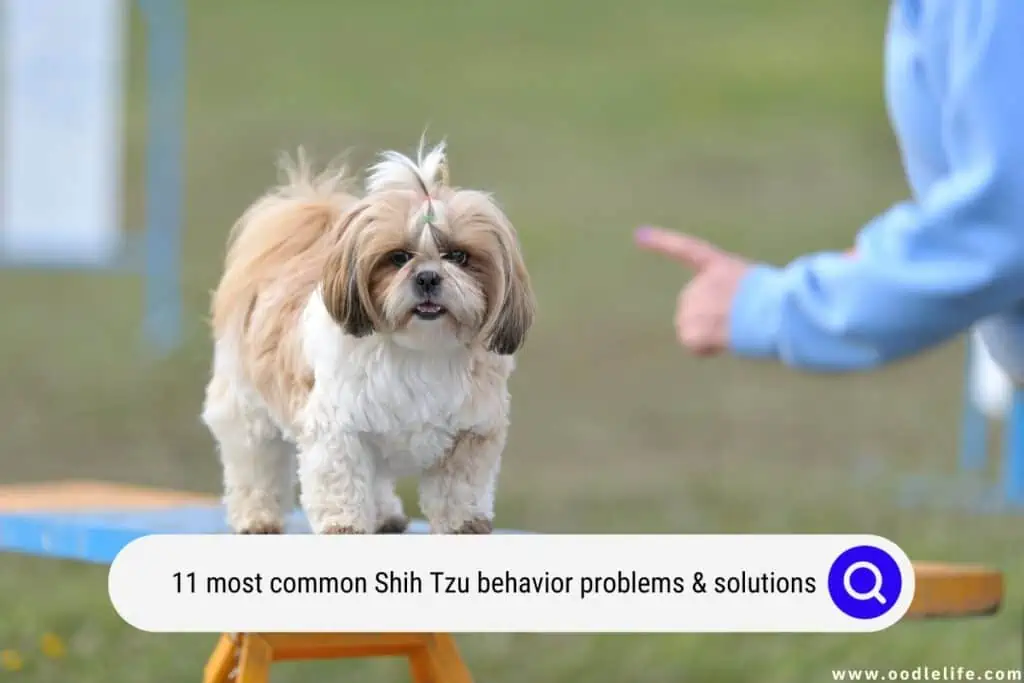
The average dog owner might identify a problem but not know its origin or how to address it. If this is your current situation, relax, you’re not alone. This detailed guide will help you understand common Shih Tzu behaviors and how to handle them.
So let’s get straight into it.
Separation Anxiety
Separation anxiety is a common issue among Shih Tzus because they’re selectively bred as human companions. Your canine friend can be agitated or frightened if you’re not around.

Common signs of separation anxiety include:
- Destructive chewing
- Excessive vocalization, shedding, growling, and pawing
- Inappropriate defecation and urination
- Constantly following you
- Unnecessary nipping, freezing, or biting
Dealing with Separation Anxiety
Since you won’t always be there for company, you must help your Shih Tzus overcome the issue in the following ways:
- Get a second pet.
- Entertain your Shih Tzu with multiple fun toys.
- Start a new crate training program.
- Hire a dog sitter.
- Train your pet not to follow you around at home.
Puppy Mouthing
A seven-month-old puppy turning your hand into a chew toy may seem cute, but it’s an entirely different story if the pup turns seven months old.

A young puppy using its mouth to play with you is a simple natural instinct. Mouthing is the first level of canine social play before the first set of teeth erupts. Shih Tzu pups use their mouths to explore their surroundings.
But this play turns rigorous once the teeth emerge, and your pup will know that mouthing inflicts pain. Being a social animal, your dog isn’t hard-wired to hurt you.
Teach Your Shih Tzu That Your Hand Isn’t a Toy
Your pup should know that mouthing isn’t acceptable. Implement gentle training after you adopt a Shih Tzu. The play session shouldn’t involve biting or chewing on your hand.
Eating Issues
Picky eating is one of the behavior problems of a Shih Tzu. Your Shih Tzu knows what it craves, but it doesn’t speak. So it’ll likely refuse to eat or take a few bites of food it dislikes.

Eating issues can be a huge concern, but you can easily address the behavior.
Dealing with a Picky Shih Tzu
Here are some practical steps if your canine friend is a picky eater:
- Discontinue any meal that doesn’t work.
- Make the menu more attractive.
- Stick to a working meal schedule.
- Reconsider the food you’re serving.
- Stick to adequate serving quantities.
- Avoid being too experimental with food.
Digging
Dogs enjoy digging, and your Shih Tzu is no different. This could be because their ancestors used to drill holes for security and to hide from the elements.
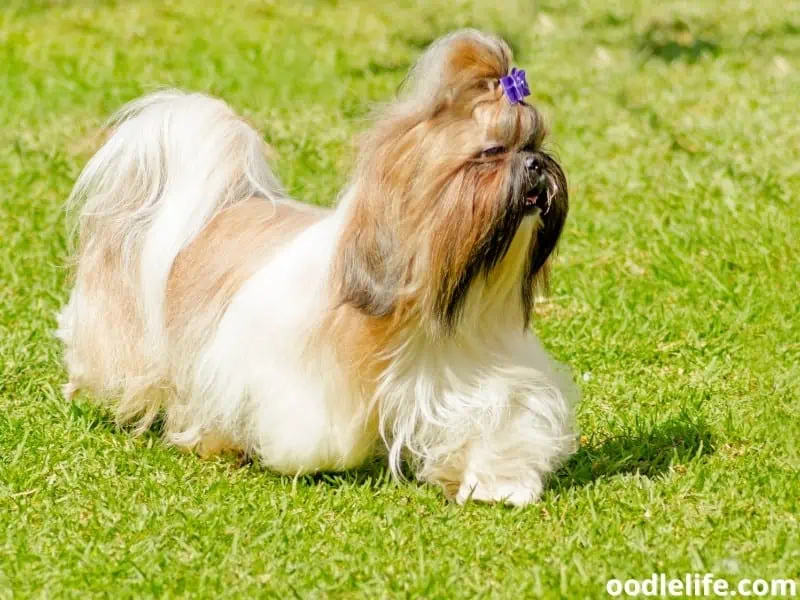
While your Shih Tzu doesn’t face these issues, digging is still embedded in its genetic code. Digging could be a bigger problem if your Shih Tzu digs holes in your yard frequently.
Dealing with a Digging Shih Tzu
You can prevent this behavior by letting your dog explore the yard under supervision. It shouldn’t venture outside without company.
Destructive Chewing
While chewing is natural, it can be a behavioral problem if your Shih Tzu chews on items that shouldn’t be eaten.

Your Shih Tzu will chew stuff when lonely or bored. Other causes that might trigger chewing include:
- Frustration
- Trauma
- Teething
- Anxiety
- Hunger
- Depression
- Excess energy
- Curiosity
Dealing with Destructive Chewing
If your Shih Tzu’s destructive chewing is driving you nuts, the following steps can help:
- Buy multiple chewing toys.
- Offer mental stimulation.
- Spray the furniture.
- Puppy-proof your space.
- Take your dog out regularly for exercise.
House Training Issues
Tenacity is among the most distinguishing attributes of Shih Tzus. It may seem cute or amusing until it becomes plain disobedience. Disobedience mainly results from the difficulty in house training this dog breed.
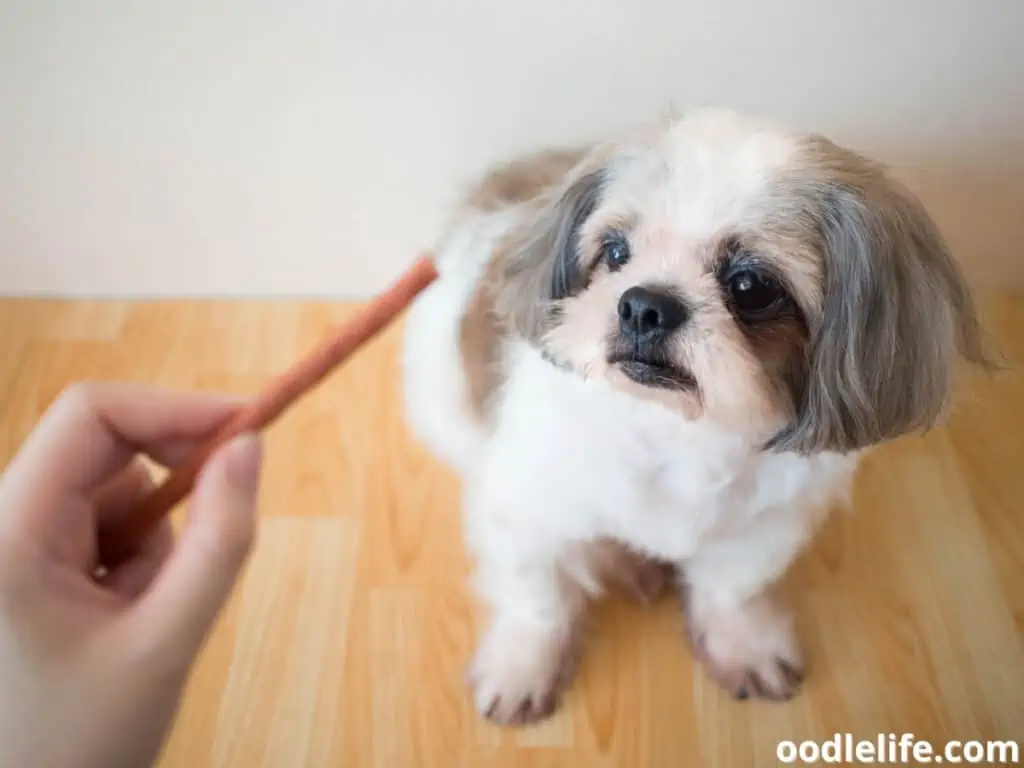
Shih Tzu House Training Tips
These practical house training tips can help:
- Initiate crate training as soon as possible.
- Practice patience.
- Avoid shouting at your pup after a mistake.
- Train consistently, repeating all the steps till you’re satisfied.
- Reward good behaviors.
- Leverage positive reinforcement.
Excessive Barking
The Shih Tzu is particularly loud, so this issue may be challenging to address. Excessive barking can be irritating and disruptive, but it’s a behavior problem you can manage.
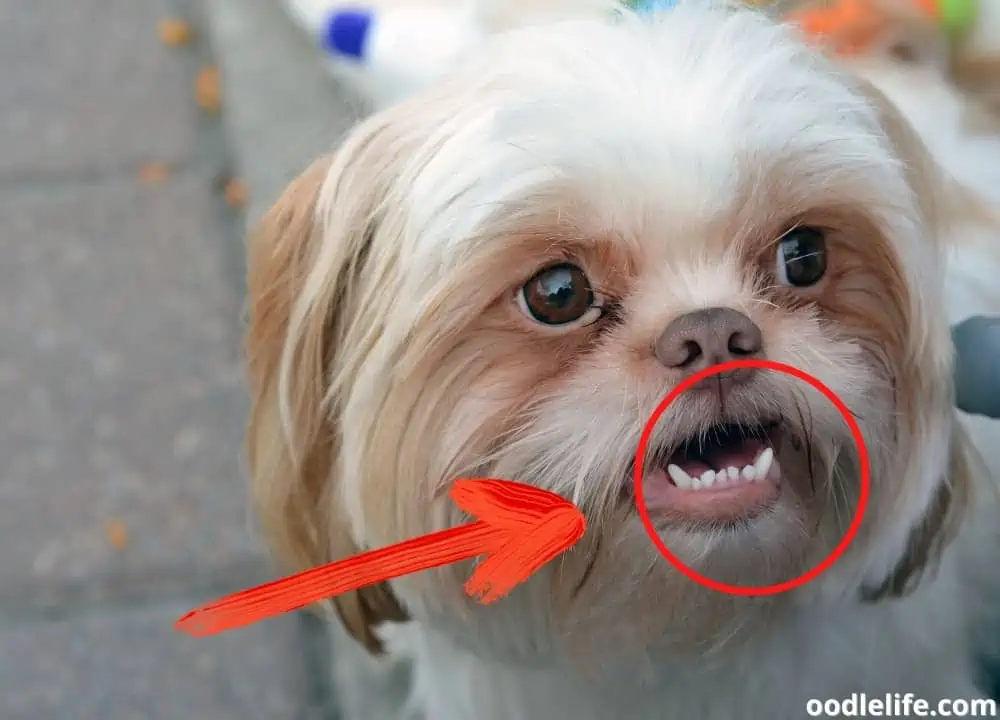
The leading causes of nuisance barking include:
- Fear
- Pain
- Alerting you of strangers
- Excitement or playfulness
- Dark environments
- Loud noises
- Anxiety
- Discomfort
- Thunder and lightning
- Seeking attention
- Movements at night
- Boredom
Dealing With Excessive Barking
You can prevent your Shih Tzu from barking excessively by:
- Providing mental stimulation and exercise.
- Introducing your pet to its object of fear.
- Providing proper socialization early enough.
- Providing a second companion.
- Ignoring your pet’s unnecessary barks.
- Removing all causes or sources of fear.
- Staying calm whenever your pup barks.
Crying
The Shih Tzu is bred to stick around its owners, so there has to be a reason for all the sobbing you may not know about. Your pet can weep for the following reasons:
- Loneliness
- Stress
- Boredom
- Hunger
- Tension
- Need for love or attention
- Separation anxiety
- Allergic reaction

This breed is known to scream or weep when lonely for extended durations. When sad, your canine friend will have their eyes bulge out and may be obnoxious or abrasive.
Dealing with a Weeping Shih Tzu
The following steps can fix the problem:
- Stick to a daily routine.
- Keep your pet busy.
- Create a stress-free environment.
- Use brain stimulation.
- Provide more attention and physical contact.
- Buy a second pet.
Begging
It can be difficult to ignore your pet’s irresistible looks, but this can encourage the horrible behavior of begging. Unfortunately, most pet owners encourage it by sharing a portion of their food. Apart from the annoying behavior, eating the wrong foods can lead to digestive issues and weight gain; hence it must be controlled as soon as possible.

Dealing with a Begging Shih Tzu
Here’s how to discourage begging:
- Avoid looking at your pet or talking to it when it’s begging.
- Turn your back when it tries jumping on you or your lap.
- Feed your canine at the same time you’re enjoying your dinner.
- Train it to do something else instead of begging for food.
- Place it in the crate or transfer it to another room while you’re eating.
Growling and Howling
A howl may seem amusing or charming, but it can irritate your neighbors. Small dog breeds growl due to aggression or fear. Your Shih Tzu might be facing both, and you’ll notice this through its constant snarl.
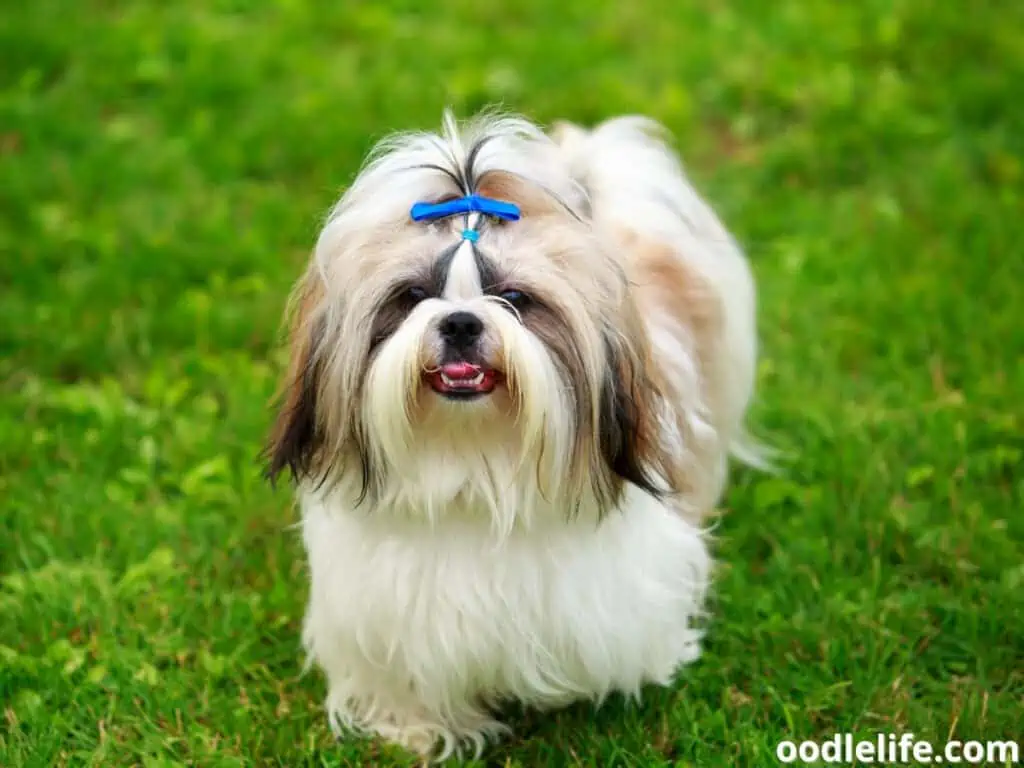
Other possible issues with your howling dog include:
- Stress
- Hunger
- Anxiety
- Pain
- Poor socialization
- Illness
Dealing with a Howling Shih Tzu
Here are some effective ways of addressing the howling problem:
- Proper socialization early enough.
- Eliminating sources of fear.
- Don’t abuse your pup.
- Offer additional mental stimulation.
- Visit a vet for medical check-ups.
- Maintain a daily routine.
Play Aggression
Your Shih Tzu can display aggression by snarling, growling, lunging, showing teeth, or biting. It’s a prevalent issue with such small breeds because most owners allow or encourage it. However, it can cause serious problems if not controlled.
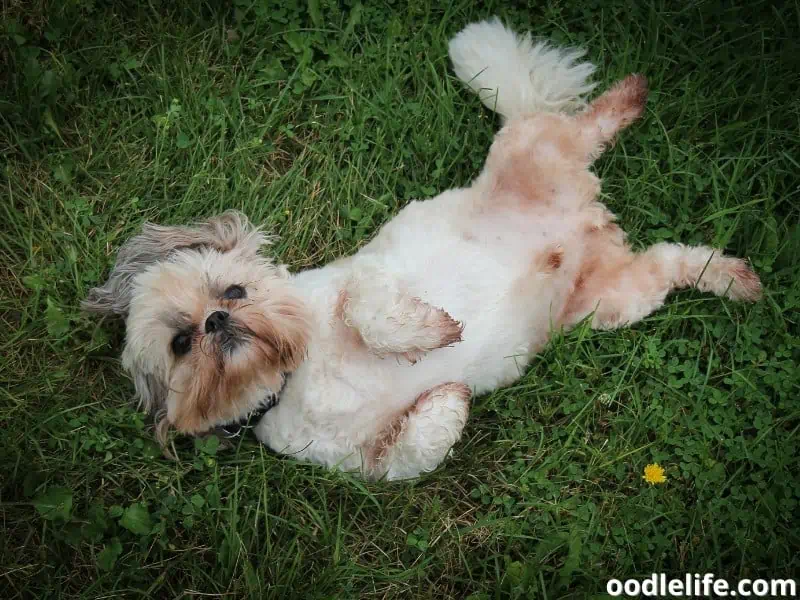
Dealing with an Aggressive Shih Tzu
You can handle this problem by:
- Getting your dog used to gentle play.
- Early socialization.
- Scheduling play dates with well-behaved adult dogs or other pups.
- Spay or neuter your dog to reduce hormone-driven aggressiveness.
- Praising your dog’s friendly play.
- Stopping your dog from playing when it crosses the line.
- Teaching compliance demands and tricks.
Final Thoughts
Whether you own a Shih Tzu or are planning to get one, you must be familiar with the everyday issues this dog breed faces. Fortunately, you have all you need in this article to create the best environment, free from the risk factors of these Shih Tzu behavior problems.